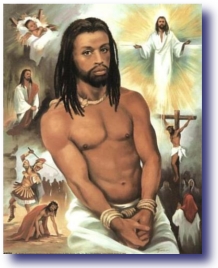“A beginning is a very delicate time…” _Princess Irulan (Dune)
 Some two thousand years ago, we are told that a child was born to a carpenter and his second wife. He was born into poverty and as things go, no one should have even known about or remembered anything about him.
Some two thousand years ago, we are told that a child was born to a carpenter and his second wife. He was born into poverty and as things go, no one should have even known about or remembered anything about him.
However, the story takes a turn when we are told that Angelic beings announced his birth. Men of learning and prestige travelled from the Orient to witness his birth and the king in the area he was born, murdered every male child under two years of age in an effort to kill him. There is another twist to this tale. His mother was said to have conceived him without ever having “known” a man. Thus, she was a virgin while she carried him.
We don’t really know much about his life until he turns 12 and resurfaces in a Jewish temple. We are told that his knowledge amazed the teachers of Jewish law and then he vanishes again. The next time he makes an appearance, he is a grown man on a mission.
At this point, the story is taken up by four different narrators. We learn of omens, signs, portents and of course miracles. He heals the sick, gives sight to the blind, causes the lame to walk again and even raises the dead. Small wonder, of the oppressed people he is ministering to, various political factions also began to take an interest.
Power Is More Addictive Than Crack Cocaine
This person we call Jesus – according to the Gospels – was building a following. Not of the wealthy and elite, but of the common, poor simple people. Rules, laws, traditions in society ultimately serve only two purposes.
- To keep a certain segment of society in power.
- To keep everybody else under their control.
 His message of giving to the poor, caring for the sick, no longer seeking or valuing material things was creating a problem. If people begin sharing what they have with others… for free, the people they’re sharing with, are not buying goods and services. If you’re a farmer and have a field that needs harvesting, and your friends whom are also followers of Jesus come and volunteer to help you bring in your crops, the people whom you would normally have hired, are out of work. If you then turn around and give away food to those who helped bring in your harvest, those people are not buying their produce at the local market. Thus, as you might expect, the merchants had a problem with the teachings of Jesus.
His message of giving to the poor, caring for the sick, no longer seeking or valuing material things was creating a problem. If people begin sharing what they have with others… for free, the people they’re sharing with, are not buying goods and services. If you’re a farmer and have a field that needs harvesting, and your friends whom are also followers of Jesus come and volunteer to help you bring in your crops, the people whom you would normally have hired, are out of work. If you then turn around and give away food to those who helped bring in your harvest, those people are not buying their produce at the local market. Thus, as you might expect, the merchants had a problem with the teachings of Jesus.
What about the political structures? The worst thing you can do to those who perceive that they have power is to make them irrelevant. Jesus’ message was not to overthrow the Romans, though there were factions who clearly wanted him to lead such a revolution. When asked about paying taxes – a trap laid by the Pharisees – Jesus said, “Render to Caesar the things that are Caesar’s and to God the things that are God’s.” I know this may prove traumatic for my Republican readers, but Jesus said to pay your taxes! Jesus also said to obey the laws of the land. This hardly qualified him to be the firebrand revolutionary that would overthrow Roman rule.

Constantine was the pagan – Sun worshipper – emperor of Rome who created Christianity and created your Bible.
The religious institutions also had a problem with Jesus. He pointed out the blatant hypocrisy of the Church. By “Church” I mean the Jewish religious institutions. The Christian Church as we know it today, had yet to be invented by the Roman Emperor Constantine. That would come some 300 years later.
For example, Jesus healed someone on the Sabbath. The Pharisees had a problem with this. There is a prohibition against doing any “work” on the Sabbath under Jewish Law. Of course, in my mind, this begs for a definition of what constitutes “work?” From the accounts in the Bible of Jesus healing someone, he usually simply spoke to them… but I digress. Jesus, using the Socratic method, posed the question, “which one of you if your Ass or Ox fell into a pit on the Sabbath, wouldn’t immediately pull them out?” Of course, every last one of them would, Sabbath or no Sabbath.
Ironically, even today, there are industries creating “Kosher” gadgetry to assist practicing Jews in circumventing restrictions presented by the Sabbath. Obey the letter of the law, but the spirit of the law be damned! As the saying goes, “rules were made to be broken…” or at least, worked around. If one believes in God, what does one suppose God’s opinion is? Do you think that God looks at these workarounds and gives out points for cleverness?
Being the oldest, my parents would leave me in charge of my younger siblings whenever they left home. On several occasions, I was admonished to make sure my baby sister was in bed by 9 pm. On one such occasion, we were all watching a television program which wasn’t over until 11 pm. What to do? At 9 pm I instructed my baby sister – she was 9 years younger than I – to go and get in bed. 5 minutes later, I told her she could get back up and we finished the show, then I put her in bed. When my parents asked me the next day if my sister was in bed by 9 pm, I truthfully answered “yes.” They didn’t say anything about her getting back up. My sister loved me for my cleverness. However, if my parents had known… well, they would have had a different perspective on things. The trouble is, if one believes in God, then you have to believe that God knows that you’re employing human cleverness to circumvent the spirit and intention of his laws.
The Bible says that Jesus made of himself no reputation. What this means is that Jesus did not promote himself, did not build himself up, lived his life as a common man. People think that Jesus was poor. He was anything but poor. He was born in a stable, because of timing and accident of birth. His father was a carpenter. This means he owned his own business. His uncle was Joseph of Arimathea who was not only a wealthy merchant, but was a member of the Sanhedrin and politically well connected. If Jesus had been born a pauper, the “Three Wise Men” brought him gifts of gold at his birth. This would have immediately made his family wealthy.
Jesus could have afforded a very fine horse. Yet, he walked everywhere he went. Jesus could have afforded a very fine house. Being a carpenter by trade, he could have built himself one. He could have built churches all around Palestine. Yet, he did none of these things. He chose a life of poverty and self-denial. This is far different from the so called preachers today who measure their success by the size of their churches, their homes and the expense of their cars.
Pimping Jesus
Jesus has been turned into a commodity. His message has been repackaged, turned over to advertising agencies and is being marketed at a profit. Churches take in 100s of billions of dollars a year pimping Jesus. Tours to the “Holy Land” sponsored by various church groups dump billions into the economy of Israel.
Preachers are buying mansions, corporate jets, Bentleys and Rolls Royce cars. They’re taking vacations on the French Riviera and buying expensive yachts. They’ve got personal chefs, personal trainers, tailors and stylists. Pimping Jesus has become a wildly successful business. Jesus has become the perfect product. It is an intangible product from which you can never get a refund. You don’t know whether or not it works until after you’re dead. Of course by then, it’s too late to ask for a refund.
I often wonder, if Jesus came back today, would he even recognize today’s Church? 100s of billions taken in, mostly from poor people who can barely afford to give, yet they give because they’ve been manipulated into believing in a message that is the very antithesis of what Jesus actually taught.
How is it that with all the money churches are taking in, homeless shelters are having to turn people away? How is it with all the money churches are taking in, families with children are going to bed hungry right here in this country? Whenever those heart wrenching commercials come on my television showing children in some foreign land living in abject poverty, I think to myself, there are children living right her in these United States that are every bit as impoverished.
In Luke 18:8 Jesus asks an interesting question. He asks, whether or not he will find “faith” upon the Earth when he returns? This seems like a strange question to ask. Especially given that we have a church on almost every other corner in some communities. We have gospel recording artist who have songs that are doing well on the R&B charts. How could there not be faith when he returns? Isn’t faith everywhere? Perhaps not?
31 When the Son of man shall come in his glory, and all the holy angels with him, then shall he sit upon the throne of his glory:
32 And before him shall be gathered all nations: and he shall separate them one from another, as a shepherd divideth his sheep from the goats:
33 And he shall set the sheep on his right hand, but the goats on the left.
34 Then shall the King say unto them on his right hand, Come, ye blessed of my Father, inherit the kingdom prepared for you from the foundation of the world:
35 For I was an hungred, and ye gave me meat: I was thirsty, and ye gave me drink: I was a stranger, and ye took me in:
36 Naked, and ye clothed me: I was sick, and ye visited me: I was in prison, and ye came unto me.
37 Then shall the righteous answer him, saying, Lord, when saw we thee an hungred, and fed thee? or thirsty, and gave thee drink?
38 When saw we thee a stranger, and took thee in? or naked, and clothed thee?
39 Or when saw we thee sick, or in prison, and came unto thee?
40 And the King shall answer and say unto them, Verily I say unto you, Inasmuch as ye have done it unto one of the least of these my brethren, ye have done it unto me.
41 Then shall he say also unto them on the left hand, Depart from me, ye cursed, into everlasting fire, prepared for the devil and his angels:
42 For I was an hungred, and ye gave me no meat: I was thirsty, and ye gave me no drink:
43 I was a stranger, and ye took me not in: naked, and ye clothed me not: sick, and in prison, and ye visited me not.
44 Then shall they also answer him, saying, Lord, when saw we thee an hungred, or athirst, or a stranger, or naked, or sick, or in prison, and did not minister unto thee?
45 Then shall he answer them, saying, Verily I say unto you, Inasmuch as ye did it not to one of the least of these, ye did it not to me.
46 And these shall go away into everlasting punishment: but the righteous into life eternal.
You may want to read that twice. That is the true message of Jesus. Notice at no point is anyone asked about their religious affiliation, how much money they gave to their church, whether or not they paid tithes or even whether or not they believed in Jesus at all.
Now read the following and ask yourself if this is talking directly to and about all these preachers that have been pimping Jesus for gain?
21 Not every one that saith unto me, Lord, Lord, shall enter into the kingdom of heaven; but he that doeth the will of my Father which is in heaven.
22 Many will say to me in that day, Lord, Lord, have we not prophesied in thy name? and in thy name have cast out devils? and in thy name done many wonderful works?
23 And then will I profess unto them, I never knew you: depart from me, ye that work iniquity.
So, what do you believe? No really? You don’t get any credit for donating money to a church. Caring for the poor, feeding the hungry, tending to the sick, sheltering the homeless and clothing the naked is a personal responsibility. Only you can discharge this obligation. Remember, it was the act of turning over the tables of the money changers and driving them out that triggered the events that led to Jesus being crucified. Today, the money changers are no longer out in the courtyards. Today, they’re running the Church. Are you following Jesus, or just pimping him?









